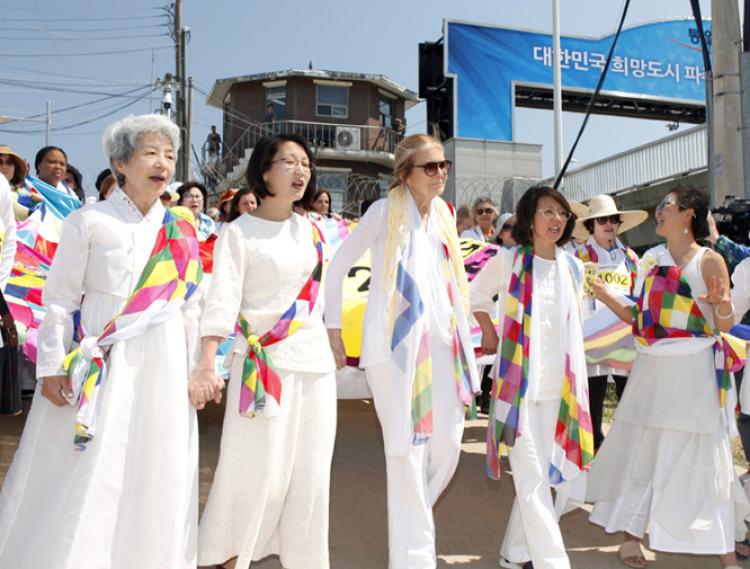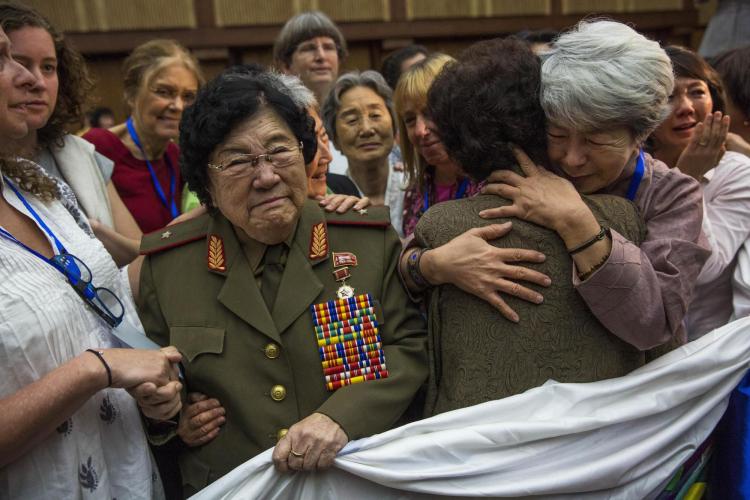One Step at a Time
Addressing international impasse with education, leadership and understanding
Christine Ahn awoke from a vivid dream in 2009 and exclaimed, “I know who will end the Korean War: It will be women.” Six years later, she and fellow leaders were taking steps toward her dream by organizing a women’s peace walk across the most militarized border in the world, the demilitarized zone (DMZ) between North and South Korea. The peaceful demonstration cast new light on the Korean Peninsula, an international focal point since the unresolved Korean War. Not long after Ahn and advocates made headlines, she returned to CU Boulder as an INVST Community Studies alumna to talk with students about organizing peace and humanitarian delegations. From the Olympics to missile tests to peace deals, Korea has once again been in focus. With our school’s community leadership programs thriving, this is a critical time to revisit Ahn’s important work and words.
By Christine Ahn, INVST Community Studies alumna
Known as “the Forgotten War,” the Korean War was brutal. In just three years, nearly 4 million people were killed—mostly innocent civilians. The U.S. bombing campaign destroyed nearly 80 percent of the North. Just one year into the war, a U.S. general told the Senate “there are no more targets, everything is destroyed.” The fighting came to a halt when North Korea, China and the U.S., representing the U.N. Command, signed the 1953 armistice agreement. They promised to return in 90 days to hammer out a peace deal, but the peace deal went unsigned for more than 60 years.

Participants of the Women Cross DMZ March, including Ahn (fourth from left) and Gloria Steinem (third from left). Photo: Niana Liu
One of the legacies of the ceasefire is the 2-mile-wide DMZ, established as a buttress between the two Koreas. With 1.2 million landmines, thousands of armed soldiers and barbed wire, the DMZ is intended to keep families separated and the Korean people from seeing, knowing and understanding each other.
On the 70th anniversary of Korea’s division, it seemed appropriate to do something bold that shook the status quo and shined a light on the insanity of this division. The women’s peace walk across the DMZ was just that.
The idea emerged from a dream. I was working at the Global Fund for Women at the time and managing a program called Women Dismantling Militarism, which supported hundreds of inspiring grassroots women’s efforts worldwide—from Colombia to Congo—to challenge war and militarism. It was then I had the most incredible dream about the Imjin River, which flows through the heart of the Korean Peninsula, that led to my planning and organizing of the walk.
"It was before the break of dawn, and I was wading in the river, chest high. As the sun rose over the horizon, a glow of light gently flowed down the river. It was people carrying candles in their palms, and that light then morphed into the most beautiful family reunifications, of elderly siblings clutching brothers and sisters they had not seen for a lifetime."
"I remember being moved to tears but wanting to keep going upriver to the source of the light. So I waded up the river, and that’s when I came upon a circle of women."
I began ruminating about how women will do this. I received a fellowship to research the efforts of Korean women to build peace. I learned the first meeting of North and South was convened by a Japanese woman, which drove home the important role of women from outside the peninsula during times of inter-Korean impasse. Then I found inspiration for a peace walk when five New Zealanders crossed the DMZ by motorbike. I thought, ‘If they can do it, we can, too.’ I set off to make this dream come true.

Photo: David Guttenfelder
On our 10-day journey, we met with North Korean women in Pyongyang for an international peace symposium, walked with 7,000 women in Pyongyang and Kaesong, crossed the DMZ on International Women's Day for Disarmament, were greeted by 3,000 South Korean women and held a second peace symposium in Seoul.
Why did we walk? To invite all concerned to imagine a new chapter in Korean history, one marked by dialogue, understanding and, ultimately, forgiveness. We walked to help unite Korean families tragically separated by a man-made division. We walked to reduce military tensions on the Korean Peninsula, which have ramifications for peace and security throughout the world. We walked to urge our leaders to redirect funds devoted to armaments toward improving people's welfare and protecting the environment. We walked to end the Korean War by replacing the armistice agreement with a peace treaty. And we're going to continue walking to ensure that women are involved at all levels of the peace-building process.

